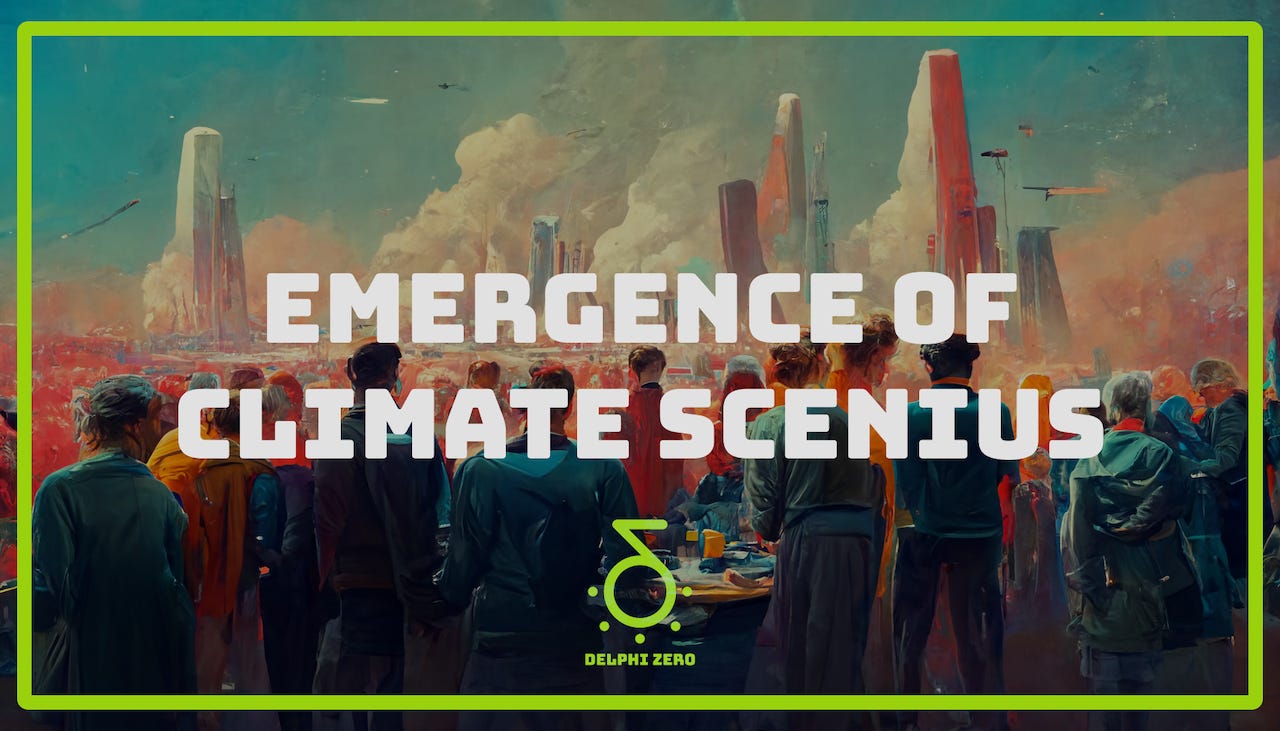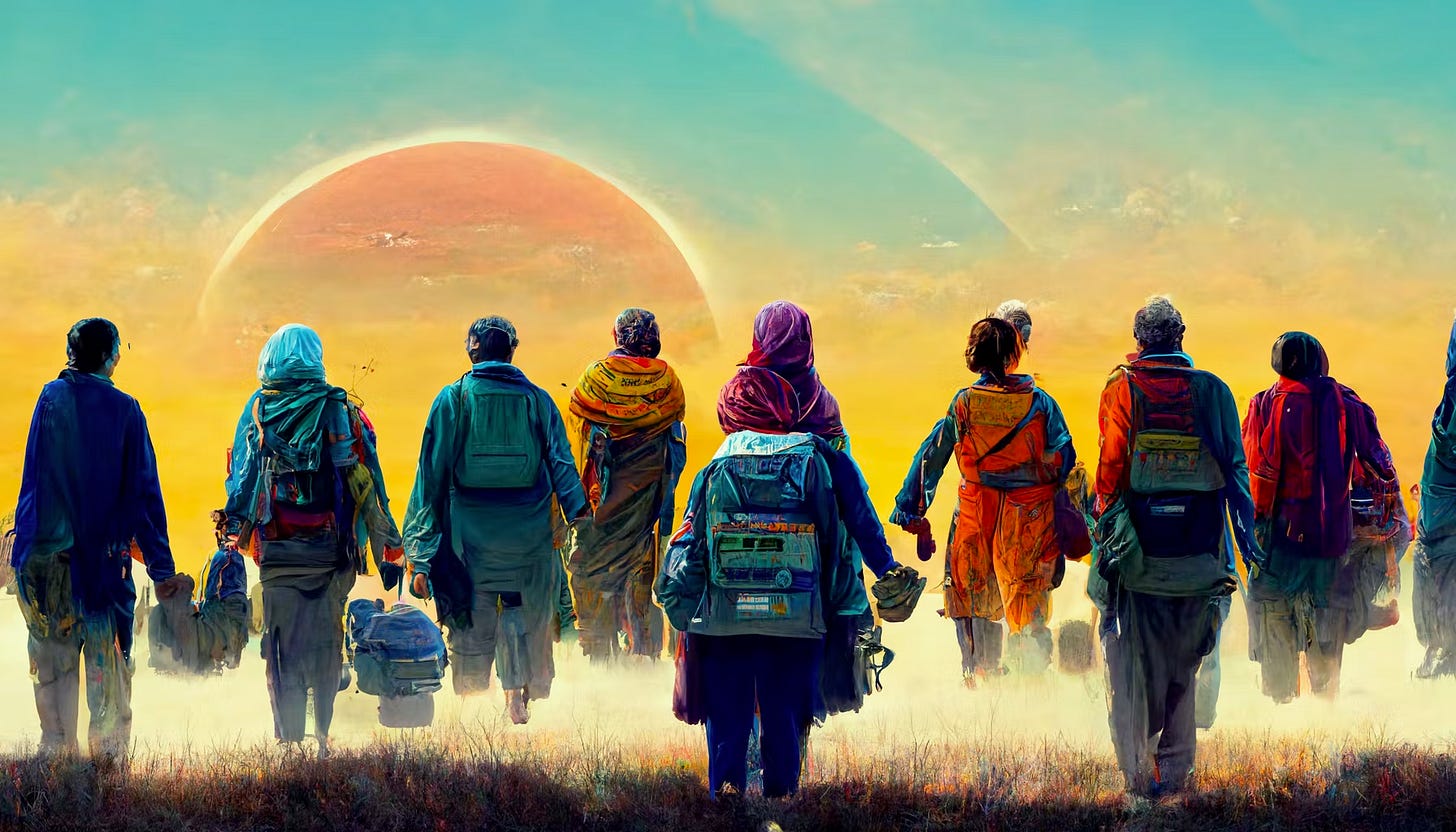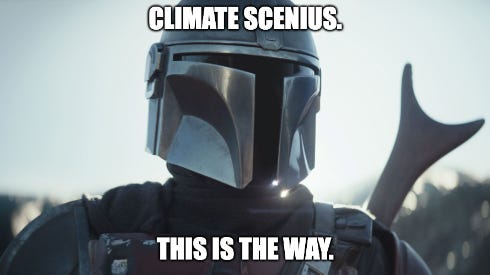👋 Hello to 17 new readers who joined in the past three days! We are 291 climate buddies 🌳
This is the second time this week that you hear from me. Usually, I write on a weekly cadence but boy oh boy was The Drop conference awesome. Yesterday evening when I got home, my girlfriend asked me how it was and I said: “It was the most magical experience I’ve had in a long long time.” I’m beaming 🤩
All the impressions and inspiration have to be put in writing. I promise, this essay will be a fun one.
Emergence of Climate Scenius
By Art Lapinsch
I drank the climate tech Kool-Aid a while ago.
In a recent essay titled “Climate Tech: The Greatest Game”, I summarized my core belief:
A perfectly-balanced challenge in an expansive world makes climate tech a great game. Yet a noble mission, an improved rule set, and an inspiring set of players make it the greatest.
I understood it in abstract terms but this week I felt it. Finally.
Cafe Griensteidl: The Cradle of Fin-de-siècle Vienna
Before we dive into climate, I’d like to take us back to 1897.
My hometown - Vienna - was at its peak. The capital of the Austro-Hungarian empire, one of the largest metropoles in the world, and a melting pot of various cultures. The quintessential manifestation of the time was the Viennese Coffee House - a place to meet, discuss, and inspire.
Cafe Griensteidl was chief amongst them because it was the watering hole for some of the luminaries of that time:
Arnold Schönberg (Composer, Music Theorist, and Pioneer of Atonal music)
Stefan Zweig (Writer and Pacifist)
Gustav Klimt (Painter)
Sigmund Freud (Neurologist and Founder Psychoanalysis)
Arthur Schnitzler (Doctor, Writer, and one of the Founders of the “Wiener Moderne” movement)
and many more …
It was a hodgepodge of ideas and looked something like this 👇
Tim Urban - the crazy mind behind Waitbutwhy - would call this an Idea Lab. A space that favors (a) independent thought, (b) intellectual diversity, (c) humility, (d) and most importantly productive arguments. This era was called Fin-de-siècle Vienna and was the catalyst for progress across arts and sciences.
2022 in climate has similarities to 1897’s Vienna. Let me explain 🌳
Scenius: The Power of Collective Genius
The term ‘Scenius’ was coined by musical pioneer Brian Eno, who described it as “the intelligence and the intuition of a whole cultural scene. It is the communal form of the concept of the genius.”
Scenius is an answer to one of the most important questions of historians: “Why are some periods and places so astonishingly more productive than the rest?”
Packy McCormick wrote a seminal essay on this topic called “Conjuring Scenius”. Seriously, grab a coffee and read it on a weekend. In it, he walks through various periods, which have driven tremendous progress. Unsurprisingly, Fin-de-siècle Vienna was among those.
But Packy didn’t only lay out the historical context, he also created a list of ingredients, which help to kickstart a scenius:
🦠 Catalyzing Event: Crises are great catalysts for change.
🌳 Audacious Mission: There needs to be a common goal for the members of the scene.
💚 Right Environment: The right place at the right time.
🥳 Diverse Talent: The collective mind is greater than the individual parts.
Let’s see how all of these play out in the current environment and why we see the Emergence of Climate Scenius.
Climate: Emergence of a New Scenius
So here are the four ingredients as I perceive them right now:
#1: Generational Dumpster Fires 🦠
The Renaissance followed the Bubonic Plague, Les Années folles arose after the first World War, and Silicon Valley was the result of the defense ramp-up during World War 2.
Now, we have at least three separate catalytic currents:
Covid-19: The was the first truly global pandemic of our generation. It brought our societies to a standstill and showed us that science and international collaboration can fix colossal problems. Advance Market Commitments (AMCs) accelerated vaccine development to a speed never seen before. In climate, AMCs are now used to accelerate the nascent carbon capture technology.
De-Globalization: During the pandemic, the resilience of global supply chains was stressed but recent trends are pointing to a further de-globalization. Russia’s invasion of Ukraine has had ripple effects on energy, food, and technology markets. Policymakers are working tirelessly to increase national (energy/food/technology) security by friend-/near-/on-shoring critical systems.
Significant Climate Emergencies: 2022 was the year when climate catastrophes truly entered the world stage. In a span of weeks, natural disasters rattled countries all over the world. Military airports in the UK had to close down because their tarmac melted, nuclear power plants in France had to shut down because the rivers that were used to cool the plants dried out, and Pakistan experienced the most severe flooding in history with 30% of its area being flooded. People start to experience the effects first hand and this is setting the political dominoes into motion.
The result is a highly dynamic environment. All rules are tossed out of the window and new ones are being made up on the fly. This might look like “risk” to some but the other side of the same medal lies reads “opportunity”.
Additionally, crises harden people, as Sebastian Junger wrote in his book Tribe:
Disasters … create a “community of sufferers” that allows individuals to experience an immensely reassuring connection to others. As people come together to face an existential threat … class differences are temporarily erased, income disparities become irrelevant, race is overlooked, and individuals are assessed simply by what they are willing to do for the group.
We share the pain.
#2: Net Zero by 2050 🌳
In this industry, we have a commonly understood Everest that all of us are aiming for: Net Zero carbon emissions by 2050.
It is ambitious yet achievable. It is quantified yet leaves enough room for creativity. It is the social contract we had been missing for many years.
Packy McCormick argued a super important point in his essay:
As Walter Isaacson wrote in his biography, Leonardo Da Vinci, “By applying mathematics to art, Alberti elevated the painter’s status and advanced the argument that the visual arts deserve a standing equal to that of other humanist fields.”
Through mathematics, artists, critics, and patrons could now view art objectively. More importantly, artists could compete. This created a flywheel: Objectivity led to competition. Competition brought new incentives to make better art. Incentives led to innovation and improvement. Innovation and improvement begot competition.
In climate, this objectivity is carbon. We are measuring everything in terms of emission reduction, emission avoidance, and carbon capture. This fosters creativity and accelerates innovation. The variety of solutions (technology, biology, chemistry, social adaptation, synthetics, etc.) in climate tech is just mind boggling 🤯
We have a common goal.
#3: Modern Serendipity Mechanisms 💚
It’s no longer 1897 but community and interaction are still important.
Luckily, we have expanded our ways of interacting with each other. Many people I met at The Drop use the following mechanisms to increase inspiration and serendipity:
Individual Sparring Partners: This is a super helpful one. Founders help each other out and do regular chats to riff on ideas, challenges, and everything in between. Since climate tech is such a massive market it feels that everyone is helping each other out. We want to succeed collectively because of the big hairy goal: Net Zero by 2050.
Topical (Online) Communities: There’s a plethora of online communities, slack channels, and online education cohorts where like-minded people can meet. MCJ has been a gift from heaven on my personal journey. The important thing is that geographic distance is no longer a constraint. Different regions, different backgrounds, and different opinions lead to more creative outcomes.
Physical Meetups: Events like The Drop are a blessing after two very long years apart. Nothing can replace the occasional shoulder-rubbing with your kin.
All of the above leads to sharing of learnings and failures, co-investing opportunities, and general network effects, which benefit the entire industry. Remember, you’re just one question away from a life-changing introduction.
We succeed together.
#4: The Greatest Journey Group 🥳
In “Climate Tech: The Greatest Game”, I wrote:
Let’s be real: We usually have the most fun when it’s shared with someone else.
Remember what I said about my favorite games? “All of those games were shared and played with my friends. We had a great time together.”
I feel the same way about climate tech. So far, this is the game where I found the smartest and most well-intentioned people. Smart because of the complexity of the game. Well-intentioned because up until recently it was a fringe topic where you had to be a nerd with a heart of gold to even try.
To enter the game in 2022 means you’ll get to work with a journey group that is inspiring as hell.
This was before actually meeting this journey group in person. And what a difference that makes.
In the two days in Malmo, I met plant scientists who are now funding carbon capture companies, industrial designers who act as futurists to help companies imagine solutions for the future, and entrepreneurs with fuck-you-money who still wake up every single day with the single goal to give us a fighting chance against climate change. All of this diversity is fueling our own creativity.
We improve together.
Climate Scenius: The Mother of All Positive-Sum Games
Maybe there’s something wrong with my brain but every time I think about the conference, the climate buddies, and the mission at hand, I feel high!
It energizes me beyond belief and increases my conviction that this is the way. Honestly, I wouldn’t be surprised if in a couple of decades we look back on today and see that this was the origin of a Green Rockefeller.
This week alone we had two massive gatherings: The Drop conference in Malmo and Climate Week New York. What we’re seeing is a ton of driven people who are tinkering with the world around them. It goes beyond bits and into the realm of atoms. We are working with the fundamental building blocks of our world: elements, infrastructure, and economies.
Some are building the utilities of the future, others are developing foundational technologies, and the rest is exploring all the various nooks that this game has to offer. This diversity drives the Emergence of Climate Scenius.
We share the pain.
We have a common goal.
We succeed together.
We improve together.
🙏 Thanks to Pale Blue Dot and 2150 for hosting this event. Everyone I spoke to found it amazing and we’re looking forward to next year’s edition. Special thanks to Hampus for inviting me to come + a massive shout-out to all the new climate buddies that I met in Sweden. Y’all know who you are 🙌
As I mentioned, I drank the Kool-Aid a while ago but now I’m starting to sell it 🙌
Want to join? If yes, ping me and let’s chat.












